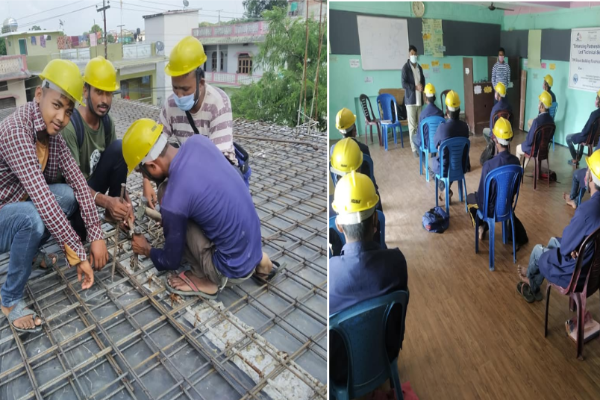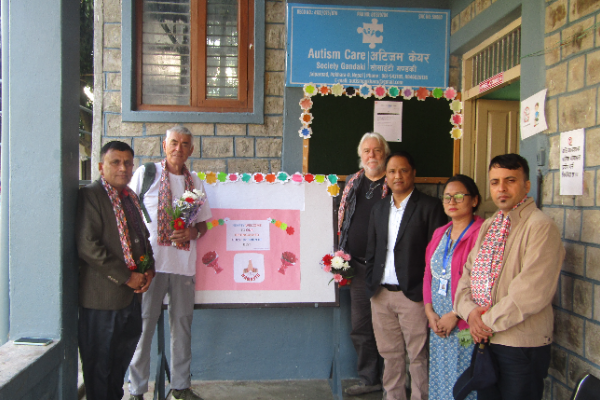The Action is primarily focused on six districts of Nepal where the sex ratio imbalance is very high. Nepal has already ratified many international commitments such as Convention on the Elimination of Discrimination against Women and Convention on the Rights of Child (CRC) to provide equal rights to sons and daughters irrespective of their caste, religion, economic status and gender. Constitution of Nepal, 2007 ensures equal rights to both son and daughter. The 2002 law that legalized abortion in Nepal also expressly prohibits sex determination and SSA. The Children's Act (1992) and Regulations (1995), Children's Act 2011 of Nepal directly negates any form of discrimination between girls and boys. Despite all legal provisions and commitments, the practices of SSA and discrimination to girl infants are increasing. Still many local authorities and government agencies, CSOs are in dilemma and lack of capacity to take any effective initiatives to address issues of SSA and discrimination against girl infants. It is evident that existing Act and laws still needs to be translated into actions and results on the ground. Coordinated and consolidated efforts from local authorities, policy makers, health service providers, CSOs, communities and policy makers is prerequisite to effectively address the issues of SSA and discrimination against girl infants.
There are some issues and challenges which need to be addressed for making effective interventions to combat worst forms of discrimination against girl infants in Nepal. These issues are (i) Lack of updated information/evidences on SSA and Female Infanticide (ii) Lack of effective translation of policies into actions (iii) Lack of collective actions to address the Girl Infants Discrimination (GID) (iv) Lack of capacity of local authorities, government agencies and CSOs to deal with GID issues (v) Lack of public/community awareness on laws and policies on rights of Girl child (vi) Lack of proper supportive roles of family/community to protect girl infants (vii) Lack of proper economic, health and educational incentives for Girl child. Thus, the Action intends to address above mentioned issues with effective engagement of target groups, final beneficiaries and all other concerned stakeholders.
Since the Action will be implemented through consortium of CWIN, WVAF, CREHPA and ICDI, the technical inputs and relevant working expertise of consortium partners add value to achieving tangible impact for combating worst forms of discrimination against girl infants. CWIN has long working experience for protecting and promoting rights of children at risk. It had provided its technical expertise to Government of Nepal (GoN) to formulate National Plan of Action for Holistic Development of Adolescent 2013. CWIN is operating Child Helpline in five different districts on behalf of Government of Nepal (GoN). CWIN has been working for protecting and promoting rights of children for more than 25 years. CWIN's existing working relations with policy makers, local authorities, government agencies and CSOs will further enhance capacities of target groups and final beneficiaries of the Action. WVAF's previous experiences with women groups, human rights defenders, child rights protection groups, local authorities, government agencies and CSOs will be utilised for enhancing their capacity and advocacy skills to combat discrimination against girl infants in a more participatory and integrated manner. WVAF supports to mobilise women's groups, youth, disadvantaged communities, social and religious leaders and CSO networks for ensuring their participation in taking initiatives for combating discrimination against girl infants. CREHPA has been working on generating research based information and evidences on population and reproductive health, GBV and rights issues for 20 years. It has already carried out many researches on abortion issues and utilized the evidences to influence the national policy. CREHPA will provide its technical expertise to generate empirical data on the determinants on SSA, information on existing norms, beliefs and practices contributing adversely to rights of girl's infants. All these will help policy makers to identify gaps on implementation of existing policies and formulate new policies to address SSA and female infanticide. Local authorities and government agencies can use the empirical data and information to formulate their future plan to protect and promote rights of girl infants. While ICDI (an Europe based NGO), is responsible for providing technical support for building and strengthening capacity of partners, and CSOs on Girl-QUAT monitoring tool for promoting girl friendly development interventions in the Action districts. ICDI also support to capacitate partners and target groups to adopt best practices and success cases based its experiences in different European and Asian countries for combating worst forms of discrimination against girl infants. The collective initiatives of the consortium partners for the Action will enhance knowledge, skills, technical and managerial capacities of target groups and local stakeholders to combat worst forms of discrimination against girl infants in an integrated and holistic way to achieve sustainable impacts.
Executive Summary of the Action:
Global overview of the Action’s implementation for the reporting period (no more than ½ page) : (Request to WVAF and CREHPA: please give your valuable inputs in a brief narration)
The Action is being implemented in six districts namely Bhaktapur, Chitwan, Kaski, Rupendehi, Surkhet and Kanchanpur of Nepal where the sex ratio imbalance is very high and focused on contributing to decrease the worst forms of discrimination against girl infants through enhanced civil society capacity, partnership, and community based education, leading to the decline in sex selection and girl infanticide in Nepal through:
Advocacy and lobbying at national and district levels to effectively implement girl child focused economic, education and health incentives to reduce Sex Selective Abortion (SSA) and female infanticide;
Strengthening the capacity of CSOs including Girls Advocacy Groups, social and religious leaders and media;
Establish research based evidences on existing norms, values and practices perpetuating discrimination against girl infants and using the evidences for policy reforms, design interventions and measure behavioural changes; and
Adapt and implement Girl-QUAT (quality assessment tool of services for girls and young women) and use best and use best practices to protect and promote the rights of girls.
There are some issues and challenges which the Action is trying to address for making effective interventions to combat worst forms of discrimination against girl infants in the selected districts. The issues are (i) Lack of updated information/evidences on SSA and Female Infanticide (ii) Lack of effective translation of policies into actions (iii) Lack of collective actions to address the Girl Infants Discrimination (GID) (iv) Lack of capacity of local authorities, government agencies and CSOs to deal with GID issues (v) Lack of public/community awareness on laws and policies on rights of Girl child (vi) Lack of proper supportive roles of family/community to protect girl infants (vii) Lack of proper economic, health and educational incentives for Girl child. The Action has been implementing through consortium of CWIN, WVAF, CREHPA and ICDI, with the technical inputs and relevant working expertise of consortium partners for achieving tangible impact for combating worst forms of discrimination against girl infants.
During the second year of project implementation, WVAF has successfully developed standard ToR, training guidelines and five training manuals and reports for future reference of the partners/CSOs/Local stakeholders. Also based on the training manuals developed, WVAF successfully conducted the following trainings: 2 days district level Capacity development Training to local authorities and stakeholders for girl child friendly interventions at local level and capacitated 170 participants; 2 days Training to conduct SBCC on reducing SSA, Female Infanticide, Girl Infant discrimination in 3 out of 6 project districts and capacitated 80 participants Male-36 and Female-44; 7 days MToT on Psycho-social Counselling and Referral Mechanism and capacitated 26 participants and monitored and facilitated in Municipality/VDC level training conducted by CWIN; conducted 2 days Training to 25 project personnel/CSO representatives on Girl-QUAT at the national level and organized 2 days training on the use of Girl-QUAT at the district level and capacitated 168 local stakeholders from CSO network, VCPCs/MCPCs, District Child Protection Committee, CFLG committee, District Education Office, District Health Office, FCHVs, Adolescent Girls from Child Clubs, Media, Girls Right Facilitators and district project staffs etc.
Besides these, WVAF in the year II also developed training manual on Men Engage Approach and Nepali and English version of participant’s profile, screened and selected potential and alternative candidates for skill based vocational Training. Further, WVAF published an EOI in the National Daily, The Himalayan Times for skill based vocational training delivery in the project districts and screened and successfully selected the appropriate STPI through comparative chart development. In addition to this, WVAF in the year II informed and sensitized number of community people on girls rights and protection through production and broadcasting of a total of 78 and in year II 53 weekly radio programme titled Balika hamro Sarokar (Girls : our Priority). The programe was aired from one national and 6 project district based FM stations covering the entire project selected VDCs and municipalities.
List of indicators with concerned Specific Objective, and level of achievement: (Request to WVAF and CREHPA: please find your part of responsibility in the table below and fill it up with information).
Specific Objective 1:
Advocacy and lobbying at national and district levels to effectively implement girl-child focused economic, education and health incentives to reduce sex selective abortion, female infanticide or abandonment, severe malnutrition, school drop-out, exploitation, trafficking and child marriage.
Specific Objective 2:
Strengthen the capacity of civil society organizations (CSOs) , Girls Advocacy Groups, social and religious leaders including media on the advantages of girl child, identifying vulnerable families and monitoring of the incidences of sex selective abortion, abandonment and female infanticide.
Specific Objective 3:
Establish research-based evidences on existing norms, values and practices perpetuating discrimination against girl infants and using the evidences for policy reform, design interventions and measure behavioural changes.
Specific Objective 4:
Adapt and implement Girl-QUAT (Quality assessment tool of services for girls and young women) and use best practices to promote the rights of girls.



